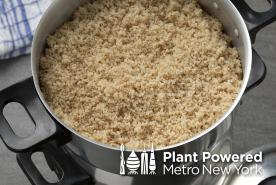October 14, 2025
Did you know that a medication for diabetes may also help protect your kidneys? GLP-1 medications, known for helping with weight loss, offer surprising benefits for people with kidney disease.
Dr. Holly Kramer, a nephrologist or kidney doctor, explains how these medications work and why they matter for kidney health.
What Are GLP-1 Medications?
Listen to “GLP-1 Medications and Kidney Disease” on Spotify or Apple Podcasts.
GLP-1 (short for glucagon-like peptide-1) is a natural hormone made in the small intestine.
“Think of GLP-1 as a messenger that tells your brain and digestive system when you’ve had enough food,” said Dr. Kramer.
GLP-1:
- Slows digestion
- Lowers appetite
- Helps the body release insulin only when blood sugar is high
GLP-1 medications mimic these effects. This helps people feel full sooner, eat less, and manage blood sugar levels.
Why Weight Matters for Kidney Health
Extra weight puts a strain on the kidneys, forcing them to work harder.
“The strain can raise blood pressure and damage kidney function,” Dr. Kramer said. “The good news is that losing weight can lower levels of albumin in the urine, a sign of kidney damage.”
Albumin is an important protein that belongs in the blood.
“Lowering urine albumin by 25 to 30% may slow down the progression of kidney disease,” Dr. Kramer said.
By lowering this marker, you can help protect your kidney function.
Side Effects of GLP-1 Medications
Like most medicines, GLP-1 medications can cause side effects. Many are mild and improve over time.
Common side effects include:
- Nausea or vomiting: Often occurs when starting or increasing the dose. Eating smaller meals may help.
- Constipation or diarrhea: Staying hydrated and eating fiber-rich foods may reduce these symptoms.
- Muscle loss: Exercise and work with a dietitian to ensure you’re still getting enough protein.
- Headache or fatigue: Less common but possible.
Rare but more serious side effects include pancreatitis (inflammation of the pancreas) and gallbladder problems.
Share your experience with kidney disease and CKD treatments to help further the future of kidney care. Join the KidneyCARE™ Study and make a difference.
Types of GLP-1 Medications
Several GLP-1 medications are available. Some are taken daily, while others are weekly injections. If you experience side effects with one, another type may work better.
Common options include:
- Exenatide (Byetta): Two times a day injection
- Liraglutide (Victoza, Saxenda): Daily injection
- Dulaglutide (Trulicity): Weekly injection
- Semaglutide (Ozempic, Rybelsus, Wegovy): Weekly injection or daily pill
- Tirzepatide (Mounjaro, Zepbound): Weekly injection; Works on the GLP-1 hormone and another called GIP for added benefit
Your doctor will recommend the best option based on your health, lifestyle, and treatment goals.
Here’s what to ask your healthcare team about GLP-1 medications.
Subscribe today!
Join the NKF Blog Newsletter
Get inspirational stories and kidney disease resources delivered to your inbox every month. You'll gain practical insights and expert advice to help you better understand and manage your kidney health, no matter where you are on your kidney journey.
The Role of Lifestyle in Weight Loss
GLP-1s are powerful tools, but they work best alongside healthy habits.
“They’re great medications, but don’t use them alone,” Dr. Kramer said. “Combine them with lifestyle interventions like meeting with a dietitian, eating less processed foods, and finding ways to be more physically active.”
People who use GLP-1s without lifestyle changes may gain weight back after stopping the medication.
“Think of them as something to boost your efforts with diet and exercise, not replace them,” Dr. Kramer said.
Learn more about lifestyle changes that protect the kidneys.
Have Questions?
Reach out to NKF Cares. Call toll-free at 855.653.2273 or send us a message for support and answers about kidney health.



















